Do NOT Buy Water Softener Systems Until You Read This!
This article is my unbiased review of the best water softener systems. It will point out everything you need to know when considering a water softener.
This will include a consideration of how they work, the different types of softener systems (e.g. dual-tanks softeners, salt-free etc) and why you need one.
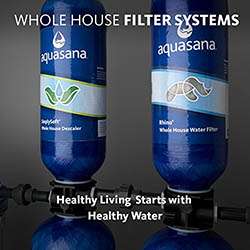 Water softeners (often misspelled “water softener“) help to remove and eradicate hard water.
Water softeners (often misspelled “water softener“) help to remove and eradicate hard water.
Hard water is the thing that causes horrible difficult to wash off white limescale that is around your kitchen sink, tap and in your home appliances like your kettle.
Hard water causes other problems like it makes it harder for your soap and shampoo to lather. It also causes drier skin, hair, duller looking clothes and can cause clogged up plumbing pipes.
Around 13 million homes suffer from hard water in the UK and according to the U.S. Geological Survey, around 85% of homes in the US have hard water issues.
The only efficient and fail proof way to resolve hard water issues is to use water softener systems.
The Best Water Softener Systems Buying Guide
What Is Hard Water?
Hard water is water that contains a high amount of dissolved minerals like calcium and magnesium.
It is technically water that contains over 1 GPG of dissolved “hard” minerals. But in truth, water that contains anything up to 3.5 GPG is actually relatively soft. So when using a water test kit you should consider anything more than 10.5 GPG to be very hard and problematic.
Hard Water Problems
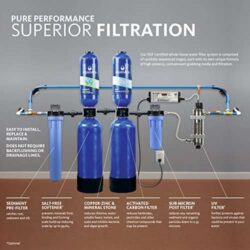 Hard water is less of an issue for your health because consuming small amounts of calcium and magnesium does not really pose a serious health risk to most people.
Hard water is less of an issue for your health because consuming small amounts of calcium and magnesium does not really pose a serious health risk to most people.
However, the major nightmare and potential expense comes from the effect it has on your plumbing and appliances.
- Severe hard water issues tend to stay hidden until you start to get some type of malfunction. When hard water is heated the dissolved minerals are likely to crystallize and form scales. These hardened minerals can clog up your pipes, plumbing and eventually reduce water flow.
- Continuous limescale deposits and hardened minerals can take a toll on different types of appliances. Specifically water-heating appliances like coffee makers, kettles, dishwashers and will increase the need for replacements and repairs.
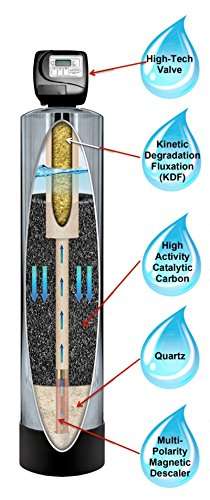
- In fact there is a study by the WQR (Water Quality Research) council at the University New Mexico. The study shows that water heaters tend to operate between 22-30% less efficiently when it has lots of hard water scale.
- Overtime the scale continuously caking the interior surfaces of your water heaters make them a lot more likely to break.
- Hard water issues don’t always easily reveal themselves as an issue when you do things like laundry, bathe or cook food. However, magnesium and calcium reduce the amount that soap is able to lather when you using shampoos, detergents or washing up liquid. This means you need to lather longer and use more soap.
There are some people that complain about hard water causing skin problems like rashes. This can be because hard water can change the skin’s pH and can leave soap on the skin which clogs up your pores. However, this only happens to a small percentage of the general population.
![]()
Solving Hard Water Problems (Hint Use Water Softener Systems)
Hard water is caused by a high presence of calcium and magnesium in your water so solving this simply means removing these minerals.
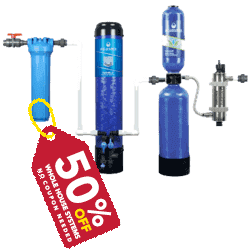 One of the most efficient ways to solve hard water problems is to get a water softener.
One of the most efficient ways to solve hard water problems is to get a water softener.
The first thing you should do is get a water hardness test kit to see what you’re dealing with.
When testing your water you should remember that the level of hardness is measured by grains of mineral per gallon GPG or some other hard water test kits measure by parts per million of mineral (PPM).
Note that 1 GPG is equal to 17.1 PPM.
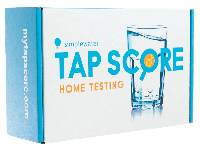 Once you know the level of hardness in your home then get a water softener system that can adequately deal with that level.
Once you know the level of hardness in your home then get a water softener system that can adequately deal with that level.
The Fleck SXT 5600 is by far one of the most popular whole house water softener systems available today. (Read: Why is Fleck SXT 5600 sooo popular?)
However, I often recommend something like the Aquasana 10 year 1,000,000 because it both filters AND softens WITHOUT using salt.
Different Types Of Water Softener Systems
Water softeners are the most effective ways to remove hard water but there are different types of softener systems and methods. The most common and popular type is the whole house water softener.
This is by far the most popular and commonly used type of whole-house water softener that removes all the hard water in your home. However, you can get portable softeners, use an ion-exchange method, a salt free or even use magnetic technologies.
Salt-Based Water Softener Systems
This is the most common and popular type of softener. It is when a softener machine uses salt to remove the “hard” minerals from your water.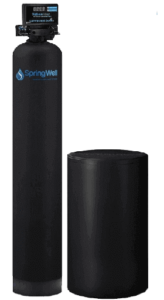
You can either get 2 types of water softener cycles through:
1) A water softener system that works with resin beads.
2) A tank that is filled with brine.
Both systems work on the principle of ion exchange. They essentially soften hard water by replacing salt (sodium) for the hard minerals it contains. Minerals like iron, magnesium and calcium.
Salt-Free Water Softener Systems
The salt-free water softener is the complete opposite of the salt-based water softener system. It doesn’t use salt to “soften” water.
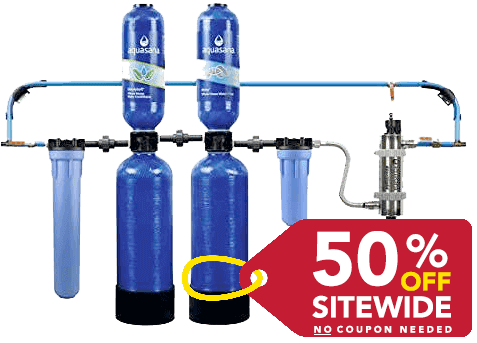 However, it can not technically be called a “softener” as such because it doesn’t actually soften your water.
However, it can not technically be called a “softener” as such because it doesn’t actually soften your water.
It only descales the pipes and conditions it so the “hard” minerals are less likely to stick.
The salt-free water softener is a great option for people that are trying to reduce their sodium (salt) intake.
Because it doesn’t actually soften water (only descales your pipes) you should not get a salt-free water softener if you have severe hard water issues.
One of my favourite saltless water softeners is the Nuvo, which I have reviewed in-depth. Read: Why I LOVE the Nuvo Water Softener System.
Magnetic Water Softener (or More Accurately, “a Descaler”)
This is also another salt free option and as such it is not technically a water softener.
The magnetic water descaler (sometimes called anti-scale magnetic treatment or AMT) works by conditioning your water by passing it through a magnetic field.
This form of magnetic water treatment makes it hard for minerals to stick to your pipes, thereby prevents them from clogging up.
The benefits are that you can enjoy chemical and sodium free treated water. However, it’s not the ideal solution if you have serious hard water issues because it doesn’t actually produce soft water. Read: Why The Magnetic Water Softener Is A WASTE Of Money.
Dual-Tank Water Softener
Need soft water 24-7 without any downtime?
Get a dual-tank water softener so that your soft water is never offline because one tank will always work when the other is recharging.
A water softener system automatically disconnects from your water source when it is recharging. 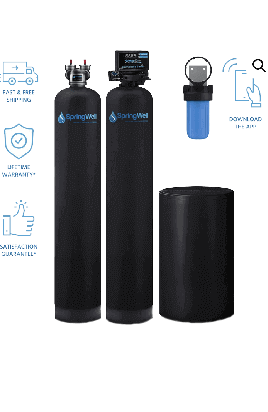
This is why regeneration cycles is usually set to happen during the night when you’re less likely to need it. However, you’re in trouble if you need soft water during the regeneration cycle.
Needing water when a single tank is offline is an even bigger problem if you have a big family or large water needs.
You should get a dual tank water softener system to avoid this problem.
Dual tank water softener systems essentially ensure that you get softened water whenever you need it.
One of the most popular dual tank softener machines is the Fleck 9100 SXT that has a fully adjustable valve automatically controlled by the meter. This means you can set it and forget it.
What You Need To Consider Before Buying A Dual-Tank Softener
- Bear in mind that a dual tank water softener may need more space than a single tank system.
- You will need to install it where it can serve the main inbound water supply line which allows it to supply soft water to your entire home.
- Also select a location that is near an electrical power outlet. Read my article: How to Install a Water Softener for more about where to place water softening systems.
- Another thing to consider are external awards. For instance, features like a NSF (National Sanitation Foundation) certificates as well as a strong warranty offering are signs of a good product.
- NSF certification essentially means the water treatment product has been tested to see if it does what it says it will. While manufacturers who produce good quality products will be happy to back it with a long warranty. Most will provide you with a 3-12 month money-back guarantee and 5-10 year warranty. Note that a good water softener should last at around 20 years.
![]()
Water Softener Systems Size & Features
There are 2 things that separate one water softener from another. The first its size and the second are its features. So before you buy your next water softener consider these issues so you don’t make any mistakes.
Water Softener Size
Getting the right water softener size is one of the most important considerations you can make. This is because a water softener machine will take up space, not just the machine but space around it for maintenance.
If you don’t have a lot of space then you might want to consider a compact or portable water softener. However, this smaller softening unit will be unable to handle a larger capacity and the demands of a family home.
The confusing part is that water softeners come in lots of different sizes, capacity, speeds etc.
The general rule of thumb is the larger a water softening machine, the more capacity it has and the higher level of water hardness it can cope with. So if in doubt always go for a higher spec, larger softener system.
Water Softener Controls & Features
One of the best things you can do before you buy a water softener is to get acquainted with its controls and features.
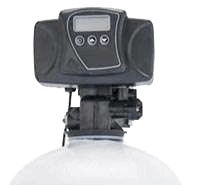 For example, go through the controls for regeneration cycles, check the length of time each cycle takes, check how much salt each cycle needs and how much water it needs.
For example, go through the controls for regeneration cycles, check the length of time each cycle takes, check how much salt each cycle needs and how much water it needs.
When it comes to looking at water softener controls, there are several different methods but they mainly fall into 2 main categories:
- Water softener timer controls. These tend to be clocks or electronic timers that automatically recharge the water based on average daily use. This approach may be insufficient if you have unusually large water usage on a particular day. Also, they are more likely to waste water and salt because it regenerates whether or not it needs to.
- Softener DIR controls. DIR stands for demand-initiated regeneration. This is a more sophisticated method than the timer control because the softener senses when the resin need to be recharged. It does this either electronically or another method that is able to use a meter that calculates and measures your usage. The DIR control is far more efficient and saves on things like salt because it only regenerates when it needs to.
Should You Buy Or Lease Water Softener Systems?
The most cost effective solution in the long term for using a water softener system is to buy it. Although there is an expensive upfront cost and the need for expert plumbing installation, it is far cheaper and less stressful in the long term.
How Much Does A Water Softener Cost?
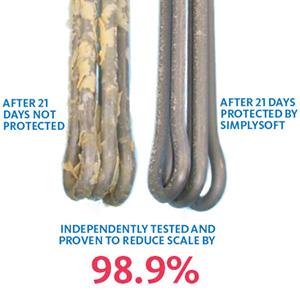 It is possible to get a popular water softener machine like Fleck SXT 5600 (read: Why is Fleck SXT 5600 so popular?) for around $500 – $700. Softener salt should not cost more than $10-$20.
It is possible to get a popular water softener machine like Fleck SXT 5600 (read: Why is Fleck SXT 5600 so popular?) for around $500 – $700. Softener salt should not cost more than $10-$20.
Water Softener Rental Cost?
Water companies like Culligan advertise that rental fees start at something like $25/month but the reality is probably closer to $100/month and there can be even more in hidden fees.
$100 x 12 months means over $1200 a year and this does not include the cost of salt and any maintenance / upkeep fees etc.
Finding the Right Water Company
- The first thing you should do is check the brand reputation and see if this is a company that produces quality products. It is always best to work with a well established company.
- This is because it means you’re more likely to get a quality product backed by a company that wants to remain in business for a while.
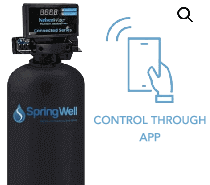
- If you need the water company to install something for you then you should try to get at least 3 quotes. When doing this be careful to compare like for like. This includes looking at whether both companies are providing you with the same type of level of service, regeneration cycle, type of controls etc. You should also consider things like warranty, fees and extra charges. For instance some companies charge a monthly fee for maintaining your softener.
- The final thing you should consider is certificates like an NSF award which confirm that a home water treatment does what it says it will. Water softener certificates will be covered in depth in the next section.
![]()
Water Softener Certificates
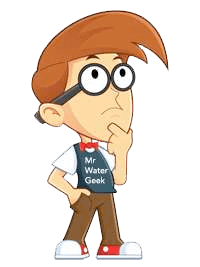 Apart from customer reviews, it’s worth assessing whether your chosen water softener system has some sort of certification.
Apart from customer reviews, it’s worth assessing whether your chosen water softener system has some sort of certification.
One of the best and most reliable is NSF International.
NSF is an independent testing organization. They routinely test and certify almost all types of water treatment products.
Another form of certification comes from the WQA, which is the water industry’s trade organization. They certify water treatment equipment so seek out the WQA Gold Seal.
 Although you should be aware that these certifications are no guarantee of quality.
Although you should be aware that these certifications are no guarantee of quality.
Just because a water treatment technology is certified to do something, doesn’t mean that it will.
All they do is signify that the equipment has successfully passed industry standard tests and the claims put forward by the manufacturer have been validated.
So make sure you take all the extra steps mentioned in this article to help you select the right water softener system for your needs.
![]()
 |  |
| Treats hard water UP TO 25 ppm (low to medium low hard water). | Treats hard water OVER 25 ppm (medium to extremely hard water). |
| Does NOT require electricity. | Requires electricity if using the electronic head monitor. |
| Control Your System With An App:? NO | Control Your System With An App:? YES |
| - Powerful salt-FREE water softener. - 1,000,000 one million gallon capacity. - Aquasana Rhino exceeds NSF standards. - Treats hard water WITHOUT salt. - Removes chlorine, bacteria, iron, sulfide, manganese, mercury, lead etc. - Includes pre-filter, copper-zinc and carbon filtration stages with standard fittings. - 90-Day Pure Satisfaction Guarantee. - Limited 10 year warranty.  | - Powerful salt-BASED water softener. - 1,000,000 one million gallon capacity. - Also includes a multi-stage filter. - Easy installation (inside or outside) - Sufficient for 1-3 bathrooms (options for 4-6 and 7+ bathrooms also available). - 6 month money back guarantee. - Limited lifetime warranty. |
| $$$ Ships to US and CA. | $$$ Ships to US, CA and Puerto Rico. |
| Sale prices automatically applied by clicking this link. | |
| If there is *no* sale try coupon code: AQGEEK50 | Coupon Code: GEEK5 |
 |  |








Hey thanks man, glad you found it helpful!
Luke
hi thanks for the information really nice information
I found many of your posts quite helpful. We just recently decided to get a water softener and RO system. I got quotes from Kinetico, Culligan and Rayne. I also gave a laundry list of requirements to a local plumber to see what they could come up with; I haven’t heard back from them yet. We ended up going with Rayne, and I find it odd that I don’t see any comments about the company online. The nearest I can tell they don’t have proprietary equipment, using many readily available parts, some made to their specifications. Their equipment may or may not be just what I could purchase myself and then have a plumber install, I’m not sure. The price seemed reasonable, and the customer support gets very good reviews (local dealer specific). Do you have any experience with the company?
Thanks.
Hi Chad
Many thanks for the comment.
I can’t say that I have come across the Rayne Water brand but I too did a quick search online and couldn’t find any Rayne Water Softener reviews or consumer reports.
Anyway, thanks for bringing this to my attention. I’ll start doing research and will try to write about it myself.
Thanks again,
Luke